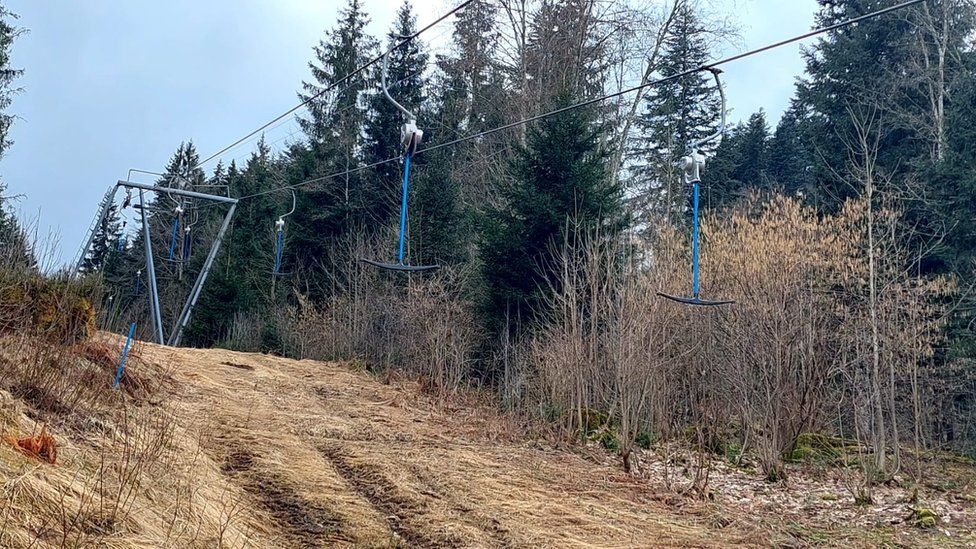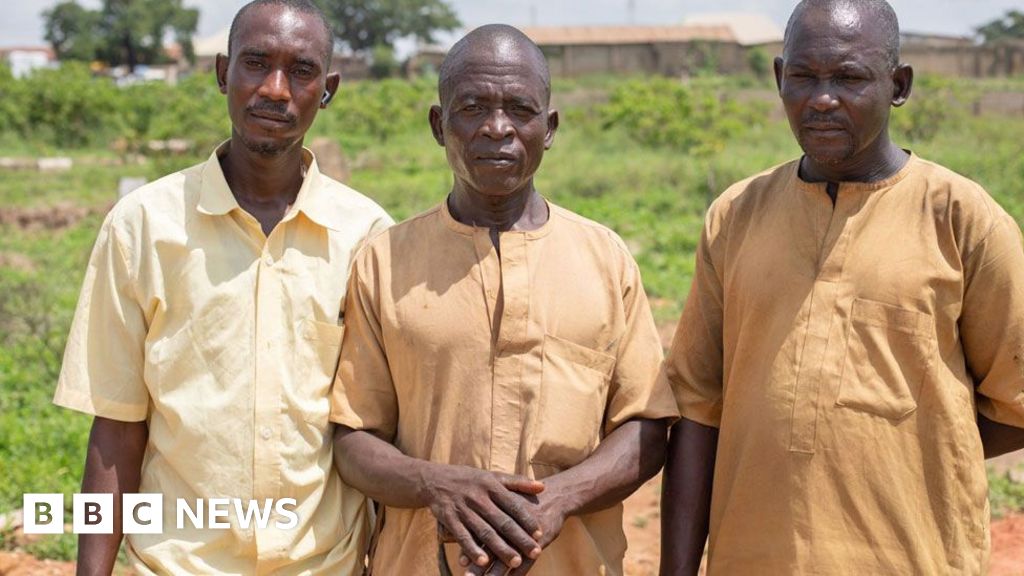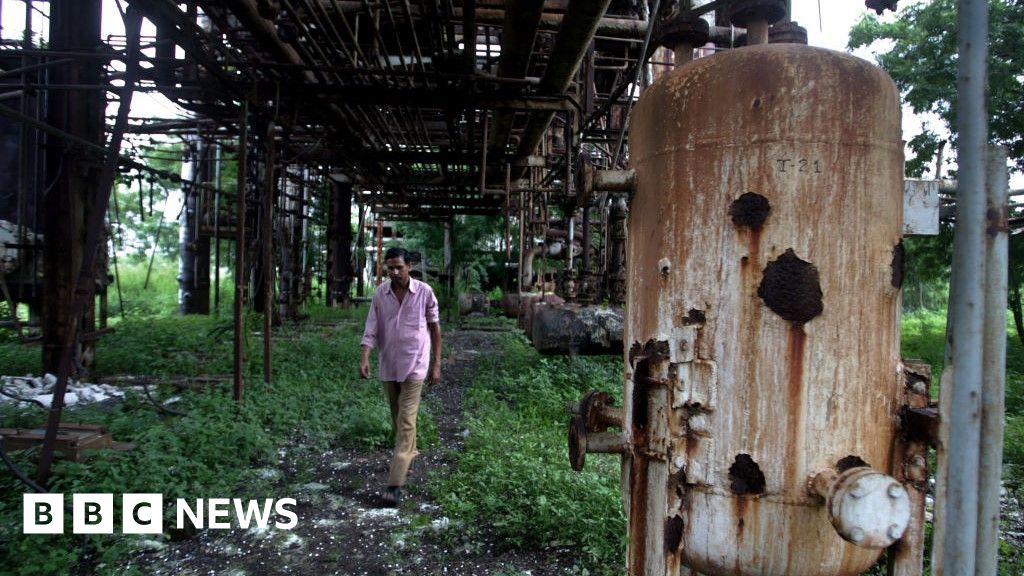ARTICLE AD BOX

The small ski resort of Rüschegg Eywald in the Swiss Alps hasn't opened once this winter, thanks to warmer temperatures
By Imogen Foulkes
BBC Geneva correspondent at Rüschegg Eywald
Just half an hour's drive from my house in Bern is a ski resort once so popular it was dubbed "Little Grindelwald", after its more famous Alpine near-neighbour at the foot of the Eiger.
Rüschegg Eywald, 1500 metres above sea level, is still much loved. Many families, including mine, spent happy days there.
But this winter season, Rüschegg's T-bar ski lift has not once been open.
At almost 2.5km (1.6 miles), it is the fourth longest ski lift in Switzerland and not for the faint-hearted.
But it has now fallen victim to climate change.
"We almost managed to open twice," says Michael Kegel, who runs the ski lift company. "But although there was snow, the ground was too warm and wet underneath."
SRF
In 10 years we won't be in business...Climate change is clear, we can see it.
Unfortunately for Rüschegg, this year is not a one-off. Last year the lift opened for only four days, and 2022 was not much better.
Just to break even requires at least 10 to 15 days per season. Rüschegg's costly piste basher, which is used to groom the snow, sits unused and gathering dust in a shed. Bankruptcy looms.
It was once all so different. When the resort opened in 1969, people flocked to it. There were queues for the T-bar, and polite but firm struggles for parking spaces. A large hotel was built, with holiday chalets around it.
That's when it got its nickname "Little Grindelwald", a nod to Rüschegg's bigger and better known neighbour not far away.
Image source, SRF
Image caption,Crowds gathered at the base of the ski lift in Rüschegg, when it first opened in 1969
"Back then people had big ideas," remembers Rüschegg's mayor Markus Hirschi.
"Calling it Little Grindelwald, people bought shares in the lift, they thought, yes, here's a thriving resort. Thinking about it now, it's quite emotional."
Warnings for years
Rüschegg is not alone. For at least a decade, lower lying ski resorts have known they will struggle for snow.
The famous null grad Grenze, the altitude at which the air temperature freezes, included in every Swiss weather forecast, has been rising along with global temperatures.
Where snow used to fall, it is now rain.
Stefan Brönnimann
"Winters were cold and snowy in the 70s. I remember the 80s, we were skating on lakes.
In his office at Bern University's Institute of Geography, now a world leader in alpine climate research, Professor Stefan Brönnimann is documenting the precise stages of global warming.
The indicators, he points out, were there long before we started setting climate targets. The 1960s, 1970s and 1980s were, he argues, the last decades of sustained, really cold winters in the alps.
"Winters were cold and snowy in the 70s. I remember 1976 was a very snow rich winter. I remember the 80s, we were skating on lakes.
"And then suddenly it stopped. 1989 no snow, it was green everywhere. 1990 no snow. And already back then people said, 'You have to change.'"
The end of an era
The highest, biggest, and wealthiest ski resorts, Zermatt or St Moritz, will survive for now, Professor Brönnimann believes. After all, they can turn on their snow cannon if it doesn't fall from the skies.
But others, including even Rüschegg's famous neighbour Grindelwald, will "have to adapt," he says.
Even the prestigious ski races held every winter in Switzerland are at risk.
In recent years there have been doubts about whether the famous Lauberhorn race can go ahead. Warm weather over Christmas and New Year has threatened the January world cup races in Adelboden.
Image source, Getty Images
Image caption,Climate change is threatening ski resorts throughout Switzerland
Stefan Brönnimann sees those golden years when the Swiss were either on the slopes, or watching their ski stars win medals, disappearing.
"Saturdays at noon everyone was in front of the television," he remembers, "and that's also changed. Ski races, they need to face that. I'm not sure whether skiing at all will really be still the main entertainment of Swiss people in the future."
Gone in a decade
And Rüschegg? "I'm a realist, I think in 10 years we won't be in business," says Michael Kegel. "Climate change is clear, we can see it. The days with snow are fewer and fewer."
Michael skied in Rüschegg as a child, so the decision to close it down will be made "with a heavy heart", but the resort is preparing "to make the best of it," promoting the area's natural beauty, with hiking trails, and mineral springs.
Luckily for the growing number of Swiss ski resorts with a doubtful future, most have a lot of natural beauty to make the best of.
Image source, Getty Images
Image caption,Climate researchers believe the days of sustained, cold winters in the Alps are now gone
Wellness, digital detox, escaping the rat race in stunning, but quiet surroundings, are all promising options for resorts where skiing will become impossible.
Stefan Brönnimann agrees that resorts across the Alps must now prepare for a life and livelihoods after winter sports.
Quoting from research done some years ago by a colleague, he fears some resorts, indeed the entire planet, may be reacting too late.
"He wrote that, when we are really sure that climate change is going on, we will look back and ask ourselves when should we have noticed? When was the time when we really should have seen what is changing, the alarm bells ringing?
"And he said, this will be in the late 80s. Then is the time when we should have seen it."

 10 months ago
48
10 months ago
48








 English (US) ·
English (US) ·